- News
- Reviews
- Bikes
- Accessories
- Accessories - misc
- Computer mounts
- Bags
- Bar ends
- Bike bags & cases
- Bottle cages
- Bottles
- Cameras
- Car racks
- Child seats
- Computers
- Glasses
- GPS units
- Helmets
- Lights - front
- Lights - rear
- Lights - sets
- Locks
- Mirrors
- Mudguards
- Racks
- Pumps & CO2 inflators
- Puncture kits
- Reflectives
- Smart watches
- Stands and racks
- Trailers
- Clothing
- Components
- Bar tape & grips
- Bottom brackets
- Brake & gear cables
- Brake & STI levers
- Brake pads & spares
- Brakes
- Cassettes & freewheels
- Chains
- Chainsets & chainrings
- Derailleurs - front
- Derailleurs - rear
- Forks
- Gear levers & shifters
- Groupsets
- Handlebars & extensions
- Headsets
- Hubs
- Inner tubes
- Pedals
- Quick releases & skewers
- Saddles
- Seatposts
- Stems
- Wheels
- Tyres
- Health, fitness and nutrition
- Tools and workshop
- Miscellaneous
- Tubeless valves
- Buyers Guides
- Features
- Forum
- Recommends
- Podcast
OPINION
“Entitled motorists will stop at virtually nothing to drive where they want”: My week as a human bollard in one of Britain’s most controversial LTNs
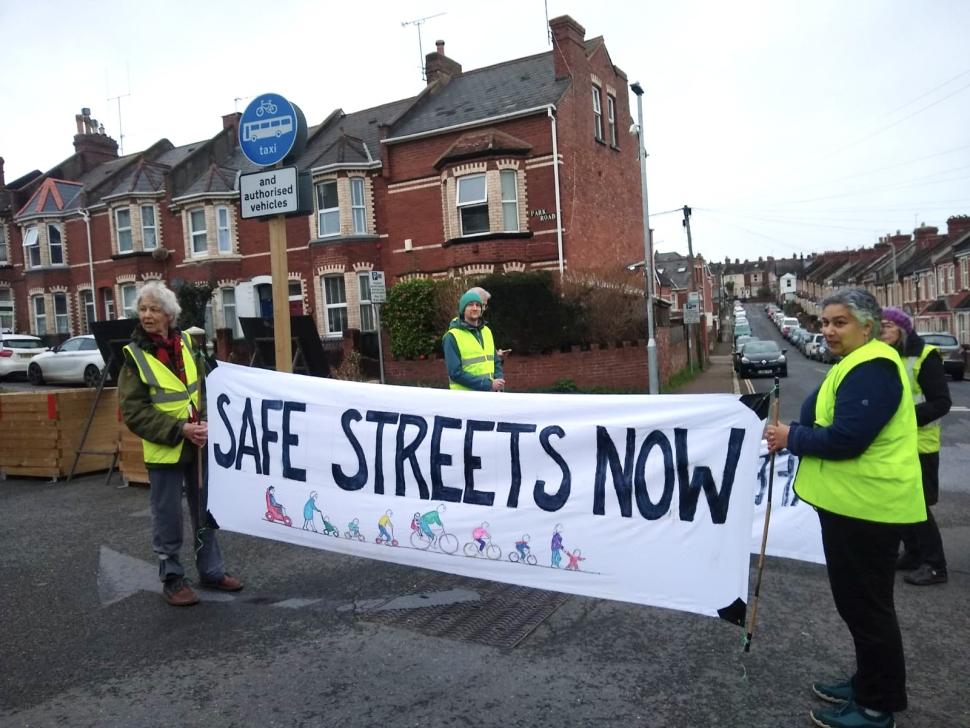 Human bollards Exeter (@ExeterCycling/Twitter)
Human bollards Exeter (@ExeterCycling/Twitter)The Heavitree and Whipton Active Streets Trial in Exeter has proved one of the most controversial of the plethora of contemporary low traffic neighbourhood schemes that have popped up across the UK in recent years.
Since its introduction in August, the traffic-calming initiative has been the constant subject of protests, vandalism, intimidation, and even an aborted attempt in January by some council officials to bring the 18-month trial to an immediate and premature halt (while also featuring as a segment on the road.cc Podcast).
Last month, a group of pro-LTN campaigners in the city – taking their cue from a similar plan in Oxford – acted as ‘human bollards’ in an attempt to enforce one of the LTN’s frequently violated and vandalised bus gates, where two cyclists, including a child and a mother with a baby, had been struck by trial-flouting drivers.
The week-long action, which saw the campaigners block the bus gate to through traffic themselves, while holding up a banner demanding ‘Safe Streets Now’, eventually forced Devon and Cornwall Police to announce that it will begin to undertake “random and unpredictable enforcement” at the entrances to the low traffic neighbourhood.
Here, Exeter-based cycling activist Caspar Hughes, a one-time London bike courier and founder of static track bike racing events company Rollapaluza before diverting his attentions to campaigning for safer roads for cyclists, shares his experience of a tumultuous week as a ‘human bollard’ at the Heavitree and Whipton Active Streets Trial.
While Hughes’ experience on the LTN frontline was far from serene – the group was on the receiving end of countless displays of dangerous driving, intimidation, aggression, and abuse – he nevertheless reckons that the action underlined the strength of local support for the trial, and why the tide may finally be turning against a worldview that sees driving as a right, and not a privilege…
What can we do?
In early February this year a driver hit a cargo bike outside a school in Exeter. There was a child in the cargo bike, but thankfully both the child and the mum escaped injury.
This crash sparked a thought in my mind. What can we do to stop this from happening again? We know that the school is in the new Low Traffic Neighbourhood (LTN) in Heavitree and Whipton, Exeter’s first contemporary LTN. The school is adjacent to one of the two bus gates in the LTN.
Shortly before this incident, I had recently been to the Exeter Cycling Campaign’s AGM, where they always have an interesting guest speaker. This year it was Robin Tucker, who has been successfully campaigning for safer neighbourhoods for cycling and walking in Oxford. One of the campaigns he discussed was their human bollard campaign. It was his talk that gave me the inspiration I needed.
> Why I risk prison to make our roads safer and save our planet – a campaigner tells his story
I was a key member of the London campaign group Stop Killing Cyclists before I moved back to the West Country.
The group was active when Boris Johnson was mayor of London, and in fact his deputy mayor said that the campaign’s “Die Ins” were instrumental in generating a conversation among London’s general public that building protected cycling lanes would stop people being killed whilst they were cycling, while also lighting a fire under their administration to start to build that network of cycling lanes.
Also, at this time London’s first contemporary LTN was being implemented in Waltham Forest. Why do I mention this? Because, as I was campaigning about cycling safety, I got to know many of the campaigners, some of whom I now consider friends, who worked tirelessly to get their LTNs off the ground. It also means I have good connections to national cycling and walking transport campaigners and a fair amount of knowledge about the history of contemporary LTNs and how the local populations adapt their behaviour as the LTNs bed in.
Safe Streets Now!
Back in Exeter, we knew that the police weren’t enforcing the bus gates, despite our county council and the local school telling the public that they were.
Our police service’s local third-party video submission portal is called Operation Snap and it was sending responses to submissions for the bus gate informing us that Devon County Council was dealing with the issue.
The council, meanwhile, was telling us the police were enforcing the bus gate. The reality was that neither of them were doing any policing, so the children going to school were being put in danger and no one was doing anything about it.
I successfully persuaded a fellow group of local Exeter folk that we should adapt Oxford’s human bollard action to suit our city. We decided to start a week of actions when school started back after the spring half term.
Our Human Bollard group was small, but with a broad range of experience. One of the women had delivered non-violent direct action (NVDA) workshops in the recent past, and she offered to run a training session for us. Another was an experienced journalist who also had press release-writing skills, another was an ex-local councillor from the area, another had sign writing skills, and one of us is an artist, which is why the banners were so beautiful. Others, including me, have extensive campaigning knowledge and skills.
We met up, chose the simple ‘Safe Streets Now’ slogan for the banners, and ran our own non-violent direct action training. There are two bus gates in the trial area; one of them had the signs vandalised and painted over. Before our Human Bollard planning meeting we cleaned the signs so the public could see them again.
We quickly realised that we wouldn’t have enough people to run a team of human bollards at each bus gate, so we decided to focus on the gate closest to the school. The plan was for one team to attend twice a day when the children arrived and left school, for a week.
Whilst some of the group had experience of NVDA, most hadn’t, so I organised a conversation by video conference with some of the human bollards from Oxford.
They confirmed what I thought, that entitled drivers will stop at virtually nothing to drive where they want, whenever they like. We were about to find that out first hand.
Fear and loathing at a bus gate
The Safe Streets Now human bollard team stepped into the road in earnest for the first time on Monday 19 February at 7.30am. Our intention was to protect the children going to school by stopping unauthorised vehicles from using the bus gate.
The week that followed was tough, really tough in places. During each one of the ten sessions, people shouted at us, drivers repeatedly threatened to drive over us, and numerous times the banners were ripped out of our hands.
People lied about what we were doing. Online, in local Facebook groups and face to face, we were being smeared as being violent and aggressive. Our traffic cones and signs were thrown around, there were threats to throw paint over us, and we were trolled extensively on social media, receiving messages like this one Dave sent me:
Twice, drivers drove directly through the people holding the banners. The second time this happened, one of them was hit, the driver drove off with the banners wrapped around his car. I called the police and we caught the incident on film. The man who was hit suffered a minor injury to his arm and continued, shaken but undeterred. The police are currently investigating the driver.
We wrote a press release and sent the footage to BBC Spotlight and Devon Live, before we shared it on our social media channels. Both the BBC and Devon Live covered the crash. BBC Spotlight included a segment on their 6 o’clock news program that evening.
The press had started before we had even stepped onto the road, with Devon Live, the BBC, and road.cc all writing articles about the Human Bollards. During the week, Devon Live also wrote about how the debate had turned ugly and left a community divided.
Tensions boiled over this morning in #Exeter as campaigners who support the #LowTrafficNeighbourhood trial stopped 50 drivers in an hour from flouting the restrictions@ExeterCycling @countcaspargh
More here: https://t.co/WGTQSrPiwm pic.twitter.com/KMDQgTQfPC
— Greatest Hits Radio Devon News (@GHRDevon) February 19, 2024
The following day, the police were called again, this time by a mum who was concerned that one of the people shouting at us was going to turn violent. They arrived and explained that as we were letting authorised vehicles through the bus gate, we were not obstructing the highway. Our actions weren’t illegal.
Despite all the anger and aggression, the Safe Streets Now team remained resolutely calm and peaceful. We often had to disengage with people shouting at us or throwing traffic cones around, but we let them finish and calmly collected the cones, repaired the banners, and got back into position.
Turning the tide
Something was happening as the week progressed. Whilst the intensity of the people opposing what we were doing remained high, there was a noticeable increase in support.
One morning, whilst a parent was politely challenging us, a man turned up with his own hi-vis jacket and asked to join us as another human bollard. He stayed with us for the rest of the week.
When a Devon Live reporter visited, people who opposed the scheme were talking and shouting at us the whole time. There were also five local residents who came to express support. One elderly man told us that the people who oppose this scheme don’t realise that nine out of ten people he knows on the street support the LTN but are too scared to say so. Every one of these five supporters spoke to the journalist, who included their quotes throughout her piece. If you create a safe space for people to express support, they do.
> Exeter Active Streets Trial: LTNs vs dodgy data on the road.cc Podcast
It turns out that some friends of mine live on the road where this bus gate is located. They explained that as the week progressed the locals started to become more confident in our peaceful and calm demeanour. Which meant that by the last session we had around 15 people milling around chatting and supporting us.
We had successfully highlighted that the local folk were concerned about the trial. We turned the reporting around and enabled the local press to write positive stories about why it is better for the street to have fewer vehicles using it. Our local MP had requested a meeting with the county council and the police. The meeting happened ten days after we finished the first week of Safe Streets Now action, and in a campaign victory, the police have now agreed to start enforcing the bus gates for the duration of the trial.
Hopefully the trial will be successful, and if it is we could see an ANPR installed to better protect the bus gate.
Transport is the UK’s largest emitting sector and private cars are the largest slice of that sector. Transport campaigning is climate campaigning. If we are to meet our Paris Agreement obligations (which are arguably now out of date) we need to see a 45 per cent cut in driven mileage by 2030.
We don’t need one LTN in Exeter, we need every residential neighbourhood turned into an LTN, protected cycle lanes on all main roads, and regular, cheap, and reliable public transport.
At the same time, we need to acknowledge that people have become so accustomed to the privilege of driving, it feels like it is a right.
For them, equality must feel like oppression.
More Opinion
Latest Comments
- wtjs 1 hour 22 min ago
Good point! Over 18 months later, and I haven't seen (could have missed it!) a long term review of this groupset
- Hirsute 1 hour 28 min ago
Merry Christmas from all Audi drivers
- wtjs 1 hour 31 min ago
What was supposed to be a 10-minute drive turned into a journey of an hour and 45 minutes The Joy, The Joy!
- unami 1 hour 36 min ago
https://www.autoexpress.co.uk/exclusive/365458/driver-whose-towbar-voide......
- Steve K 2 hours 37 min ago
A lake caused by a cycle lane speed hump/raised crossing will be a familiar sight to anyone who commutes on CS7 in London.
- Miller 4 hours 16 min ago
Pogi and a few of the others are on the divisive new Colnago aero bike in those Insta photos.
- chrisonabike 4 hours 48 min ago
I prefer "dressing for the destination" - so if I want woke headgear I'll just put my thinking cap on, thanks.
- Keesvant 5 hours 57 min ago
Been using this light for 2 years now.....
- Pub bike 58 min 51 sec ago
A similar issue occurs every weekday on Priory Lane that links the Roehampton Gate entrance of Richmond Park with the Upper Richmond Road: part of...
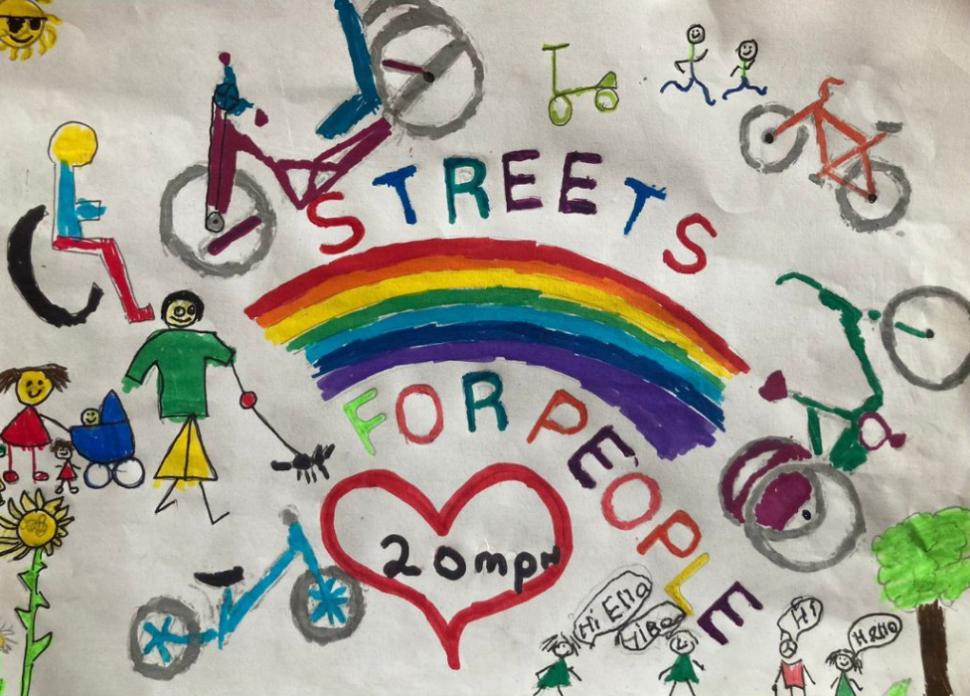
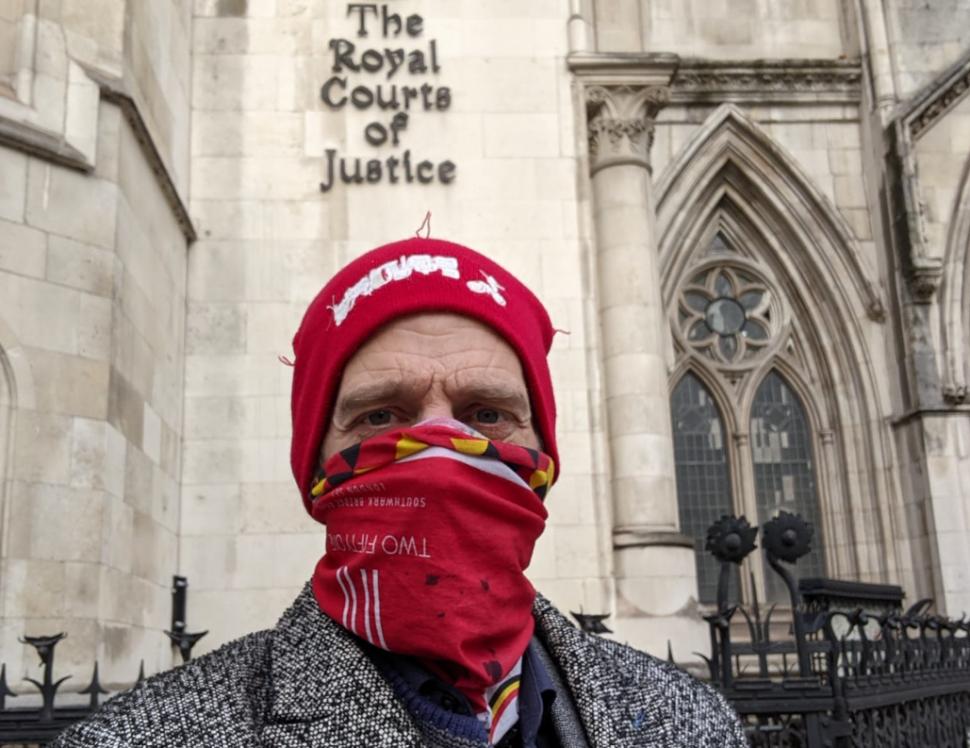
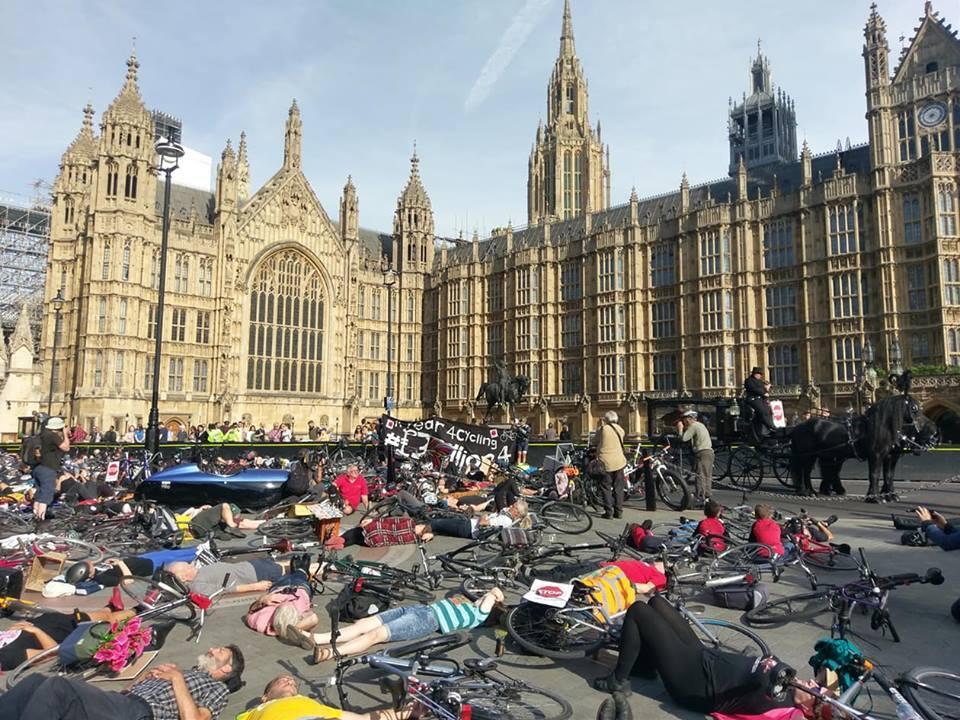
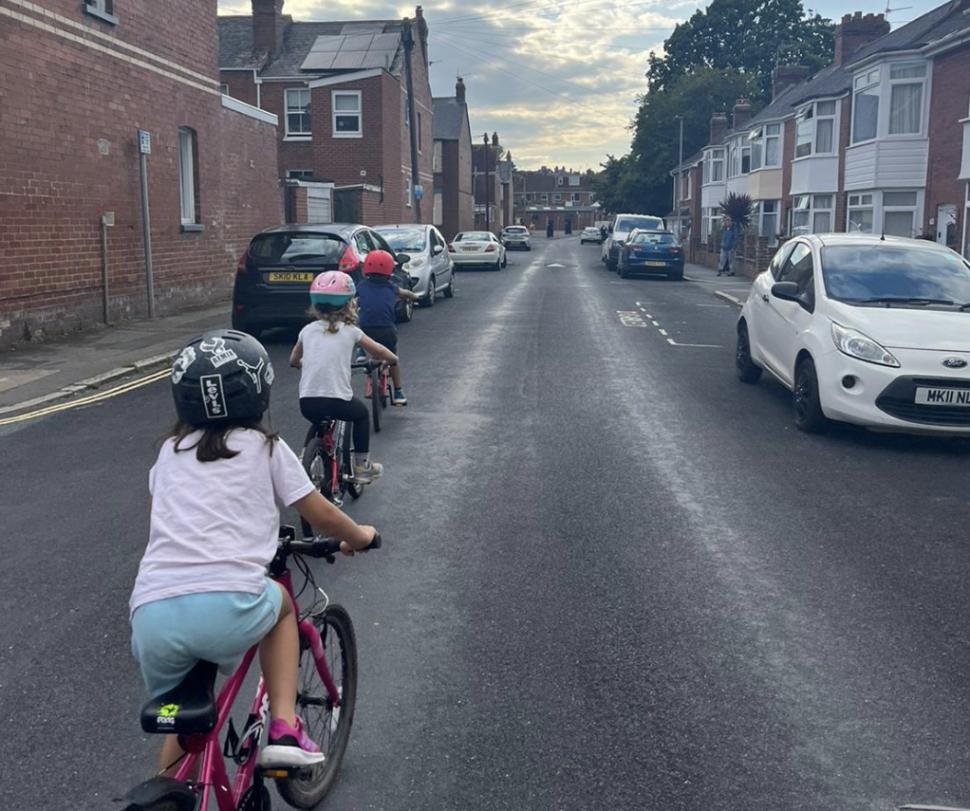
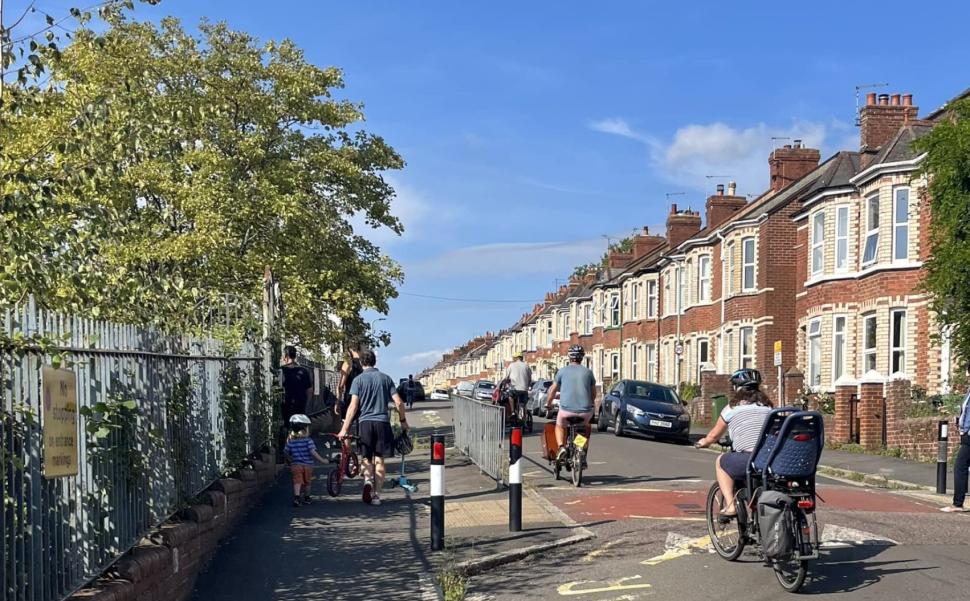

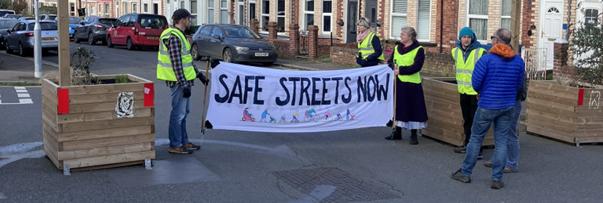
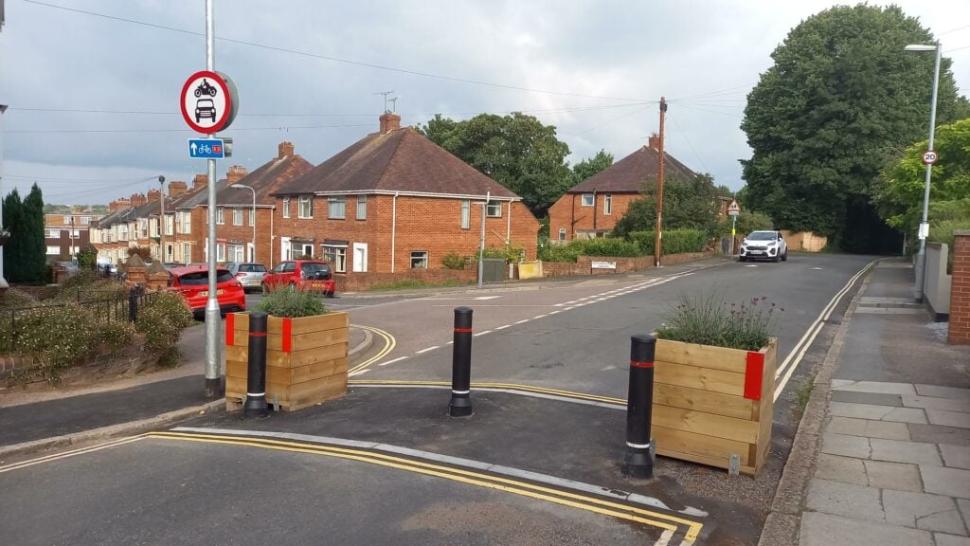
Add new comment
31 comments
Back in Exeter, we knew that the police weren’t enforcing the bus gates, despite our county council and the local school telling the public that they were. Our police service’s local third-party video submission portal is called Operation Snap and it was sending responses to submissions for the bus gate informing us that Devon County Council was dealing with the issue.The council, meanwhile, was telling us the police were enforcing the bus gate. The reality was that neither of them were doing any policing
The week-long action... eventually forced Devon and Cornwall Police to announce that it will begin to undertake “random and unpredictable enforcement”
I can predict it! The police always ensuring that they're too busy dealing with the terror-cycling menace to interfere with otherwise law-abiding motorists just trying to keep the country moving. I hope, but doubt, that we're going to hear about actual punishment of these anti-LTN nutters, as opposed to 'words of advice' which just encourage them to carry on.
Let's guess ... 90% of cyclists are also car drivers ... So magizines that try to demonise 90% of their readers are in the classic " Turkeys Voting For Christmas " club ...
I'm sure your marketing department are on top of this ..
Most cycling enthusiasts only drive because they have to, and if they were able to get around without ever needing a car, would sell it and live without. In fact, I would suggest that most people don't really enjoy driving and only think of a car as a means to acheive transport. The main reason some of those people are so militant about wanting to drive everywhere is that they so entrenched in the idea of driving, that don't realise that removing driving actually creates more freedom.
It's ridiculous that the police don't just rock up and book the motorists for disturbing the peace if nothing else. However, maybe the Tories have instructed them to not prosecute drivers due to them being "the party of the motorist" (as opposed to "the party of healthy, happy people")?
Meanwhile, here in Bristol (I'm in St George) it appears that after two years of talk and waiting, we've finally got the go-ahead for our Liverpool Neighbourhood: https://www.bristolpost.co.uk/news/bristol-news/bristols-first-liveable-neighbourhood-finally-9169812
I cycle along that road all the time - it's Avonvale Road and already has some traffic calming chicanes on it. Unfortunately, I tend to get held up when it's busy as motor traffic gets all snarled up, especially when buses are involved.
Fun fact, there's a Banksy just round the corner from the zebra crossing though it's been mostly destroyed now
Since when do the police take instructions from the government? Haven't we got some kind of separation of powers?
Oh I think that ship is majestically sailing out of the harbour...
Come again? They're called the "law enforcement" and whatever that means, it's not that they're independent from the executive branch of government.
The police are operationally independent, in fact the regional Police and Crime Commissioners have to swear in their oath of office that they will not interfere with operational independence. This dates back, dull fact fans, all the way to the Statute of Westminster of 1285 which laid down that no man may direct a constable to make an arrest, the decision being solely that of the officer. Obviously the government sets the laws but the police are independent in the way they choose to enforce them, subject to checks and balances. A recent example of their independence has been the pro-Palestine marches, where successive Home Secretaries and other senior government figures made it abundantly clear that they were willing to ban the protests if the Met made a request to that effect, but thus far they have refused to do so.
The police are operationally independent, in fact the regional Police and Crime Commissioners have to swear in their oath of office that they will not interfere with operational independence
Yes, that's right, so Lancashire is home to officially approved serial offenders like this one
Since thatcher was in power, most noticably during the miners strike.
Yes, obviously that's political influence, but I would still argue that doesn't undermine the principle of operational independence, Thatcher passed the laws against secondary picketing so the police had to enforce them, she couldn't (theoretically at least) tell them how to enforce them. The fact that pretty much every chief constable and a significant proportion of their officers in the 80s were hard-right Thatcher-worshipping bullyboys helped, of course.
Most likely since Thatcher in the 1980s
https://www.independent.co.uk/voices/comment/thatcher-s-boot-boys-when-the-unholy-trinity-of-police-press-and-government-took-root-8139816.html
https://www.theguardian.com/politics/2012/oct/27/1980s-britain-thatcherism-final-reckoning
Where one of my daughters lives close to in Oxford they are very divisive and its not as simple as put.
Its very working class v middle class due to people's employment. Its caused a lot of friction between both communities. My youngest is a senior mental health nurse.
The restrictions were/are frankly ridiculous for workers in emergency and essential services plus builders and mobile tradespeople.
Plus Oxford has hit essential motorists as well as general motorists with high cost and highly restrictive parking. This has resulted in my youngest daughters mental health section 8 members of staff leaving Oxford HA and working in Northamptonshire, Berkshire and South Oxfordshire HAs.
As travel and parking etc is so much easier and far less time consuming. Oxford HA has huge vacancy lists and of those 8 nurse who have left to join neighbouring authorities only to posts have been filled by Temps.
Ask Ambulance staff, Carer's, teachers etc their opinions, shift workers, etc etc. It is very middle class v the oiks and when LTN supporters as they have in Oxford have told emergency workers to move elsewhere if they don't like it.
They seem to forget who treat them when ill, respond to emergencies, carer for the elderly, teach their children, repair their properties.
Its far more than self car drivers it needs common sense!
Trying to stoke a right-wing culture war? Science says otherwise:
https://findingspress.org/article/23568-the-impact-of-2020-low-traffic-n...
Anything beyond 100% agreement can be characterised as divisive. In the case of Oxford opinion is divided into 56% in favour, 29% against and 15% no opinion/don't know.
I agree. I'm sick of seeing every new LTN being described by (desperate for clicks) journos as "controversial". Controversial why? Because a handful of whiny drivers take to social media because they can't stand any form of minor personal inconvenience. KSI stats - now there's controversy & a story worth telling, but no.
Thanks for the local perspective. I'm pretty sure that if there was any issue with emergency services this would either never get off the ground or that would be headline news.
The opinion that "they're stopping the ambulances getting through!" does appear in the news. However this doesn't mean it's a general truth - often a thought / feeling ("blocking the roads ... stands to reason...").
Here's an Oxford example: an actual Oxford paramedic who says these cause delay. However his ambulance service say they don't find this is an issue.
Here's a headline that sounds conclusive - from the beeb too! Last year: "Oxford LTNs: Traffic calming measures delaying ambulances, report reveals". Read the article though and this is actually reporting results of a simulation - it's more of a complex "it is predicted / it could". (Original full report here).
Of course it is possible that there is an issue with implementation in a particular point. It shouldn't be hard to resolve that since there are multiple ways of making routes permeable to certain vehicles (emergency vehicles, buses and taxis) but not others.
And of course the local system will take time to adapt. Like any change to roads it's not an instant "better in all ways overnight". That's the point really - this is system change. That means "behaviour change", not just "things will get better without me doing anything different / any cost to me".
Lots of stories available on road.cc - see info from Cycling UK on this, an attempt to explore this trope here, or here with a nice explanation of "traffic evaporation").
On "essential workers" and "working class vs. middle class" - I'm sure there is truth in the latter simply because there normally is some conflict on those lines. And "rich vs. poor" - well the rich have most things easier. That's not a reason to not do things which do in fact benefit everyone (and the disadvantaged at least as much as anyone else).
Speed limits are very divisive.
Taxes are very divisive.
And dear old Brexit is VERY divisive.
Is the situation in Oxford really class-based or is that the prism through which you are viewing it? LTNs don't stop people owning and using cars but they can make doing so less attractive/convenient because that is how you make streets safer, quieter and more enjoyable for everyone else (including drivers when they are not in their cars).
Edit: Peter Walker's article in the Graun on Friday cites a study that says active travel may provide "Health gains of low-traffic schemes up to 100 times greater than costs":
https://www.theguardian.com/uk-news/2024/mar/08/health-gains-of-low-traf...
I visited Oxford last month and used the park and ride. I am not surprised that there are restrictions on parking as there are too many cars.
I wished I had my bike, as it would have been quicker to get in and out of the centre.
I commute from one side of Oxford to the other most days, usually by bike sometimes car, and have done since long before the LTNs were put in in east Oxford. The traffic has not got noticeably worse - except perhaps near the Plain roundabout during school run time. The bits covered by the LTNs are infinitely better if you are on a bike or in a car - the rat runs along Divinty road or around Percy street between Cowley rd and Iffleyvroad used to be like something out of mad max, including the burnt out cars.
The anti LTN brigade are absolutely bonkers - the latest Oxford Times has front page rants about LTNs being racist because they are going in in East Oxford, conveniently forgetting that the leafy well off bits of North Oxford (and West and South Oxford) have had them in place for many decades, they just haven't been called LTNs and aren't "new", but the bollards and road blockages are the same and very nice too for the residents...
Great! Keep it up!
I'm not how tis would be done in Notts, so I pursue different approaches.
I applaud your positive local politics.
Yet more bollocks from this corrupt shower:
https://www.theguardian.com/world/2024/mar/15/uk-government-seeks-to-lim...
Good on you!
What I find truly baffling is that the bus gates don't already have numberplate recognition camera. How can you possibly get meaningful results from a trial (for 18 months!) without the scheme being properly operational?
That's easy to explain. Much like people on bikes being simultaneously too fast and too slow the cameras are both far too expensive and a massive tax on the hard pressed motorist.
each ANPR camera costs around 20k to install & maintain, you need minimum 2 to start with, thats 40k of your budget for this gone before youve even started.
Someone's making a lot of profit from that. It's easy enough to throw together off-the-shelf parts and make one for a fraction of that money. Don't even bother maintaining them - just swap out any breakages with another one.
https://magpi.raspberrypi.com/articles/anpr-car-spy-raspberry-pi
Well that's a delightfully angry tirade for someone just waiting to happen. Raspberry spies!
As good as this DIY ANPR camera may (or may not) be governments aren't in the habit of buying DIY untested products. Govts don't have staff with the expertise to cobble such a gizmo together and it is easier to just buy an off-the-shelf product that is a known entity from a reputable mainstream supplier (possibly a preferred or even contracted govt supplier), even if it costs $20K (or 20K GBP,; I don't have a pounds symbol on my keyboard).
A ANPR would be a good idea for these areas, or a swipe card or ticketing system (similar to shopping centre parking stations) might be another alternative, though the carpark ticketing system at my local shopping centre is often out of order, so this system may not be suitable (or my local just has cheap@r$e system sorced from Aliexpress or Temu).
Cops can't be expected to stand around 24/7 at the entries to these LTNs checking every vehicle that wants to come in. They probably actually have actual crime to deal with. Private security firms would charge a fortune to do this (if they have the staff available ), not sure who would pay for this, probably the LTN residents in the form of a levy or tax.
Obviously, if a DIY solution can be put together for a tiny fraction of the cost that they're paying, then the preferred supplier is making a huge profit and the government isn't interested in reducing costs by asking if any other companies could produce something suitable.
As far as a solution being untested - it's trivial to examine the recorded footage and see if the ANPR has correctly read the number plate. It's really not a problem.
I would suggest that the government has no appetite for cracking down on traffic crime and similarly the police don't consider it a priority with their reduced resources.
Pages